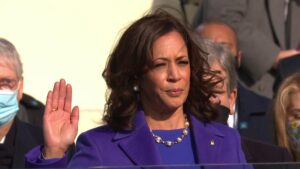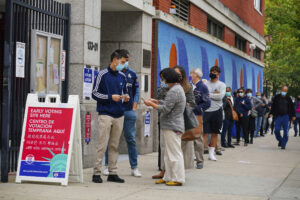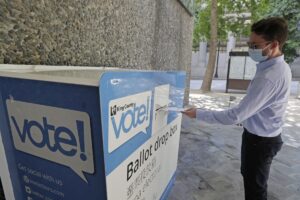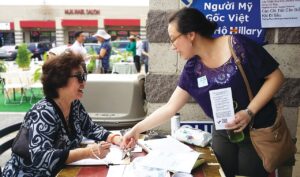 The elation of watching the first Black and Asian American woman sworn in as Vice President soured when, in the face of rising anti-Asian violence, the Biden-Harris Administration failed to install any Cabinet member of AAPI (Asian American Pacific Islander) descent.
The elation of watching the first Black and Asian American woman sworn in as Vice President soured when, in the face of rising anti-Asian violence, the Biden-Harris Administration failed to install any Cabinet member of AAPI (Asian American Pacific Islander) descent.
This discrepancy was sharpened in Atlanta, Georgia, where a white man murdered eight people; seven were Asian. Solidarity squares dominated my social media from well-meaning non-AAPI followers. High-profile politicians and celebrities railed against sexual violence against women of (mainly) East Asian descent, bemoaning the “unprecedented” rise in anti-Asian rhetoric. “Stop AAPI Hate,” “Protect Asian Women,” and other low-calorie hashtags flooded Twitter.
Aside from occasional AAPI celebrities and politicians, the anti-AAPI narrative has been drafted mainly by well-meaning persons who don’t claim an AAPI identity. When AAPI people are not leading the movement supposedly for them, the Asian diaspora gets stereotyped as helpless, hapless sex workers or somebody’s auntie or uncle.
To understand why our representation is tied to our civic power, I explored the history of Asian American civic engagement: why is the fastest-growing ethnic group so poorly understood by the non-AAPI public and its representatives? In doing so, I acknowledge my own background as a (Japanese) American and that my own understanding is limited to that experience, too.
The History of Asian American Power
The fractious Asian American community is not a recent development but a product of (predominately White) American public opinion and U.S. immigration legislation. While white Americans inappropriately projected sameness onto migrants from the expansive continent, those arriving instead attached their identities to their homelands.
Notably, waves of anti-Asian sentiment in the United States follow economic trends impacting White Americans. Legislation often reinforced ethnic fault lines: the Chinese Exclusion Act of 1882 (and subsequent Geary Act) embittered Chinese communities against the Japanese migrants who enjoyed the privileges of the Gentlemen’s Agreement into the early 20th century. Subsequently, state legislatures enacted Alien Land laws blocking Asian migrants from owning land. By the late 19th century, Japanese and Chinese immigrants were often at odds from disputes between their homelands and the hostile environment of their new country.
Economic competition between these two largest Asian migrant populations was amplified by racial discrimination. Consternation about Asian immigration engendered the term “Yellow Peril,” and associated violence deepened the division between the communities. The Immigration Act of 1921 effectively barred non-white immigration to the U.S. into the 1960s.
Following the Pearl Harbor bombing, Korean and Chinese Americans distinguished themselves from Japanese peers, wearing buttons announcing their ancestry. During the 1980s, as Japanese auto industries in the U.S. exploded, causing a perceived loss of “American” jobs, Chinese American Vincent Chin was beaten to death, mistaken as being of Japanese descent.
This, limited to East Asian American experiences, is hardly comprehensive but demonstrates the intersectionality of violence against Asians in the United States and the history of pitting one nationality against another to the benefit of neither.

People wait in a line to vote in Queens, N.Y. during early voting for the Presidential election on Oct. 24, 2020.
Modern Political Capital
This history of Asian immigrants trying to differentiate themselves by nationality is perhaps why, despite becoming the United States’ largest immigrant group, with two-thirds of Asians in America being immigrants (Pew Research), collectively, we hold minimal power in public office and the private sector.
Outside the first Asian American woman Vice President, President Biden’s cabinet is infuriatingly devoid of Asian members. As President Biden rewarded former Democratic opponents, he conspicuously overlooked Andrew Yang.
This omission was noticed. The Japanese American Citizens’ League, one of the oldest civil rights groups in the country, condemned this oversight, as did Congress-persons Mark Takano (D-CA) (PBS), and Judy Chu (D-CA) (Vox), and others in the Asian Pacific Islander Caucus. Beyond outrage, however, there is little opportunity beyond calling for more representation.
Which brings me back to my question: Why, in 2021, over a century after the Chinese Exclusion Act, and the Alien Land Laws, are we Asian Americans struggling to gain meaningful traction in the public sphere?
Some might argue that I am focusing on ‘identity politics.’ To that, I say: I am focusing on identity. Because, despite being one of the highest educated and economically successful ethnic groups in the country, we have one of the lowest civic engagement rates by self-identified ethnicity.
 Political Divide
Political Divide
Another anomaly of the Asian identity politic is the generalization of voting habits and political identity. While pollsters can partially predict other racial minorities’ collective voting patterns, the same confidence is not afforded to Asian voters. Our voting habits mirror those of white voters, reflecting education and age more than race. This is partially attributable to the diverse Asian diaspora: none of some twenty-five nationalities holds a majority in our ethnic group in America. Subsequently, there are few universal hallmarks of the Asian American experience aside, perhaps, from hate crimes and discrimination.
Without a robust activist body like other racial identities have leveraged for their interests, Asian Americans focus on ethnic identities over our larger demographic. Predictably, this has severe consequences for us collectively and individually. A Washington State school district scrubbed Asian Americans off their list of recognized racial groups, depriving them of civil rights protections (The Ticker). Washington also has consistently voted down Affirmative Action policies to protect Asian American students (NBC News). In 2020, hate crimes against Asians and Asian Americans rose a staggering 150% across the country; several of these incidents have led to serious injury or death. These tragedies are often marked by the media as isolated events, only starting to recognize the causative anti-Asian endemic racism.
Unlike other BIPOC (Black, Indigenous and People of Color), Asian Americans often set aside racial identity for other influences. Few of us would say, “As an AAPI, I vote to represent AAPI interests.” Instead, we say, “As a business owner/parent/queer person/religious person/etc., I vote to represent those interests.”
Though President Biden signed an executive order condemning racism against AAPI individuals, his is the first cabinet with no Asian American leading an administrative department. The most partisan Congress in modern history passed the COVID-19 Hate Crimes Act in the same session where President Biden quashed a protest by the only two Asian American Senators for lack of representation by promising to appoint a “Senior Liaison” to the AAPI community.
 Conclusion
Conclusion
We are asked to support candidates and parties, and in exchange, are told to be content with what we receive. That exchange is an occasional pat on the head or empty hashtag. The message is clear: the 23 million AAPI Americans are not welcomed at the table we helped set.
As I move into my adult identity, I’ve reckoned with the painful history and current trauma of my Asian heritage contrasting the anemic political force my community holds. Our self-partitioning by ethnic identity was a self-inflicted emasculation; the oppression and violence against our American bodies were not.
In the 21st century landscape of social justice and internet activism, the objective is tangible: making inroads to other cultural communities–not diminishing the experience of either, but coalescing the values of both.
 BIO: Lauren Yanase, a lifelong Portland, OR resident, is in her second year at Bennington College in Bennington, Vermont.
BIO: Lauren Yanase, a lifelong Portland, OR resident, is in her second year at Bennington College in Bennington, Vermont.
An avid storyteller, Lauren has published creative fiction and nonfiction accounts of the Japanese American incarceration and has been recognized regionally and nationally for her writing. In 2019, she earned the Girl Scout Gold Award for her documentary about the Japanese American incarceration. This is a prestigious honor, with fewer than six percent of Girl Scouts worldwide earning this award.
Her documentary, Shikata Ga Nai: An Inconvenient American, follows the story of the Kato family during World War II as Japanese Americans along the West Coast were forcefully relocated into concentration camps. John Golden, a TOSA in Portland Public Schools, says that this film, “sheds a light on a forgotten and shameful chapter in American history… and presents a story that is compelling and should be essential viewing for all high school students.” This film and other works can be found at her online portfolio, From Grandma’s House.
When she is not enjoying a mid-priced coffee or semi-athletic endeavors in the mountains, Lauren is studying and working in education and public policy.
